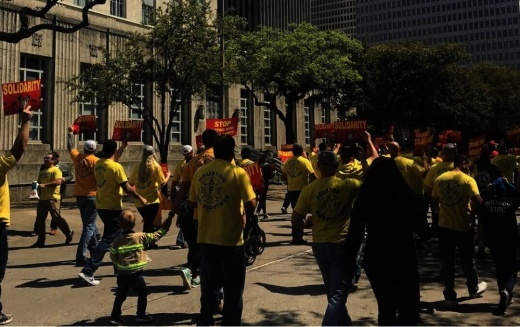In a 12-4 vote, the Houston City Council voted March 9 to increase the maximum contract amount between the city and Norton Rose Fulbright, the law firm representing the city in its ongoing legal battle related to a firefighter pay parity dispute stemming from a 2018 ballot proposition often referred to as Proposition B.
At-large Council Members Michael Kubosh and Letitia Plummer voted against the ordinance along with District A Council Member Amy Peck and District J Council Member Edward Pollard.
Proposition B is a charter amendment that requires Houston firefighters to receive the same pay as Houston police officers. The battle for better pay has been ongoing since 2017 after Mayor Sylvester Turner walked out of a contract agreement with Houston firefighters.
Proposition B passed in November 2018 with the approval from 59.24% of voters.
The original lawsuit was filed by the Houston Police Officers’ Union against the city of Houston and the Houston Professional Fire Fighters Association. The suit claims Proposition B is an “unlawful expenditure of taxpayer dollars in connection with an unconstitutional amendment to the Houston City Charter.”
Instead of defending firefighters, the city ended up joining the lawsuit against pay parity, HPFFA President Marty Lancton said in an interview with Community Impact Newspaper.
Lancton said the association is intervening, defending the will of voters who have made their “voice loud and clear to ensure that democracy prevails."
As previously reported by Community Impact Newspaper, the city has repeatedly said Proposition B would be “financially devastating.” Turner has previously said it would cost the city $100 million every year, a sum he said would lead to a reduction of services and significant layoffs, potentially including both police and firefighters.
On July 29, 2021, the 14th Court of Appeals ruled in favor of pay parity. The ruling came just months after Turner used federal stimulus funding from the American Rescue Plan Act to give firefighters an 18% raise over a three-year period.
“We are appreciative of the Court of Appeals, and we are confident that, at the end of the day, these continued attacks against our men and women and our families will end up in the same way that they did in the court of appeals,” Lancton said.
The Texas Supreme Court has not yet decided whether it will take the case. The city of Houston has until March 23 to file a response with the court to legal arguments previously raised in a filing by the HPFFA.
With the approval of the agenda item, the maximum contract amount with the law firm rises from $500,000 to $675,000. The extra $175,000 is to cover expenses related to research, preparing for and presenting oral arguments, and briefing on merits, according to the ordinance.
Since Houstonians voted in favor of Proposition B, Kubosh said he does not feel it is necessary for the city to continue the lawsuit.
“I want the council members to know what we’re really voting on here is supporting the law firm to overthrow an election,” Kubosh said. “And I’m opposed to that.”
To ensure an issue like this does not arise in the future, Kubosh said he plans on asking the Texas Legislature this year to establish a city attorney position that is elected by voters, a move he said would help ensure the attorney represents Houstonians and not necessarily the administration.





